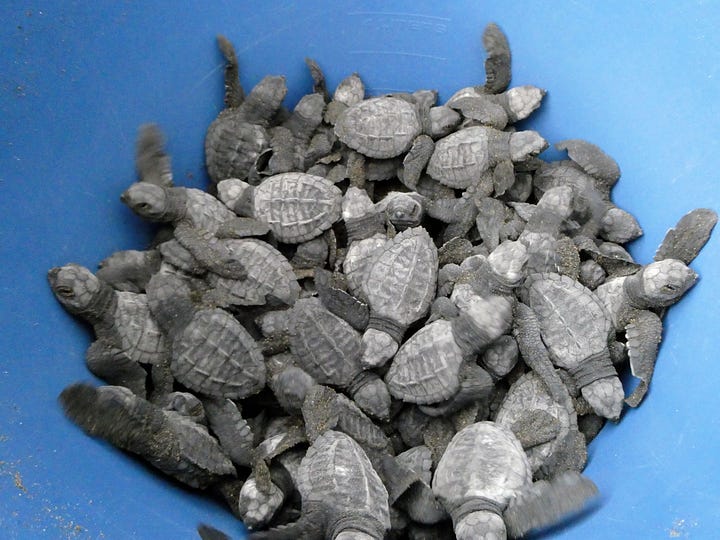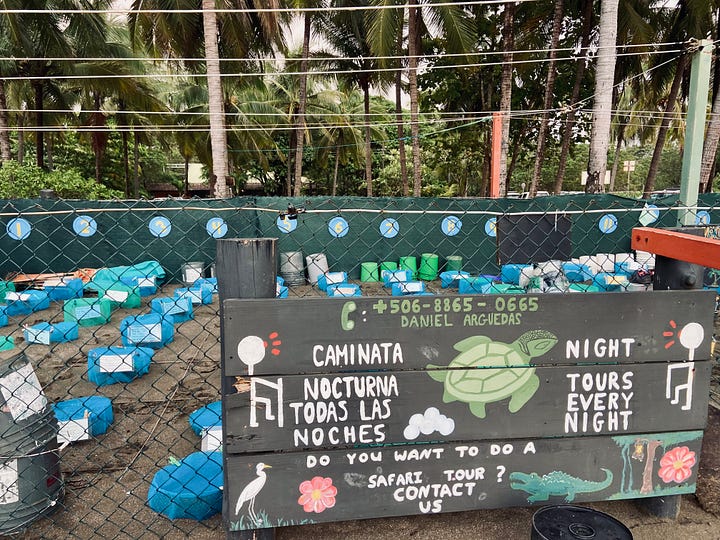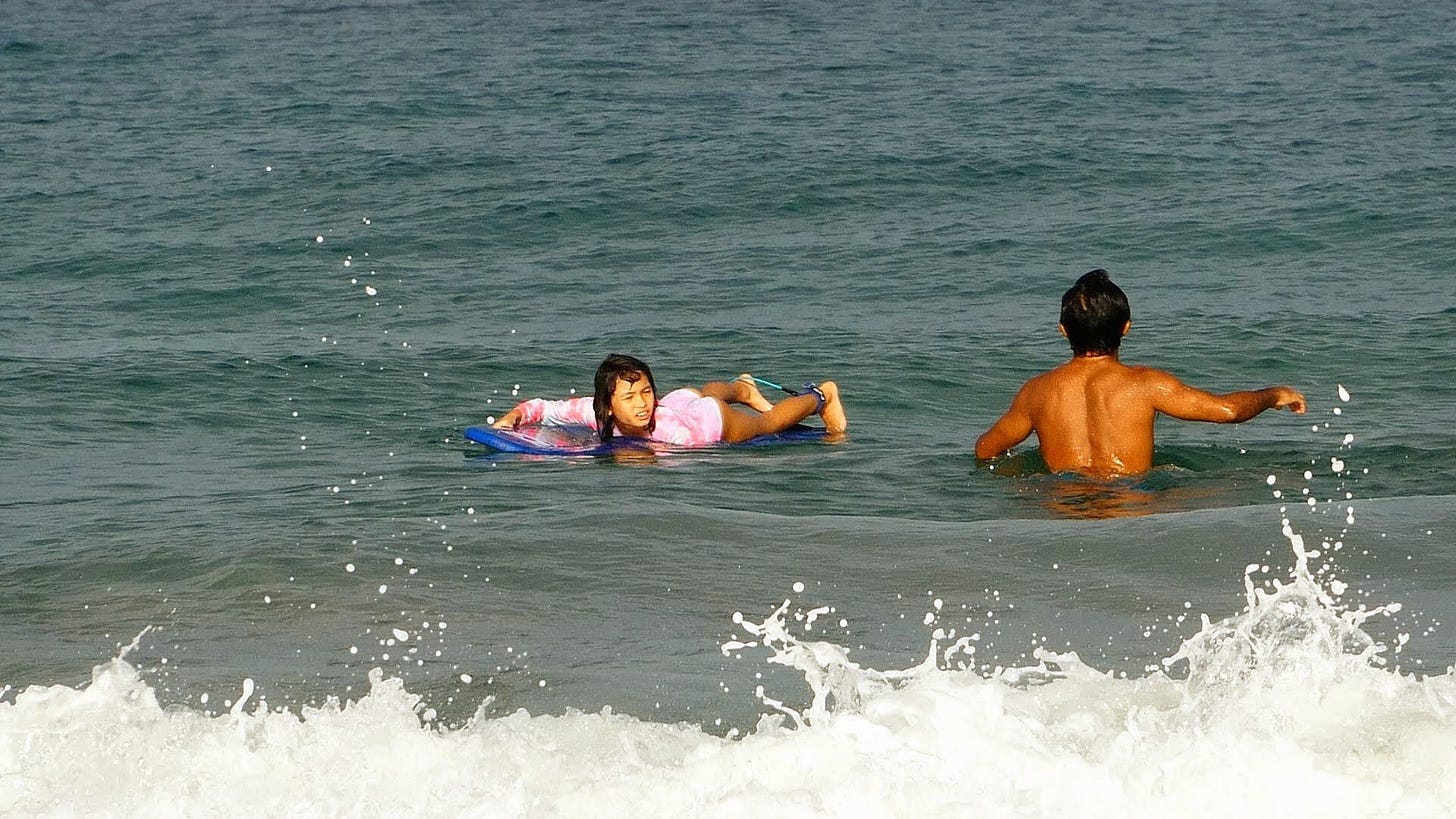Hello, friends.
The title is not a rhetorical question—I’d really like to hear your thoughts about quitting, whether they are around your own experiences of quitting or dealing with your kids’ desire to quit.
Beanie stopped going to Surf Academy a couple of weeks ago. She had been doing well for a while and seemed to be enjoying herself. Then the instructor brought them to a different beach with bigger waves, and she spent two hours out in the water getting her face smashed by waves. After that, she was done. We brought her to lessons for two additional weeks, but she refused to get on her board. And when Beanie doesn’t want to do something, it is quite hard to get her to do that something.
There are two sisters in the surf class who are Beanie’s good friends. They also weren’t keen on surfing after a few lessons and wanted to stop. Their mom bribed them with some trinkets they’d wanted from the local market, and she was successful in getting them to continue. We didn’t even try bribery, because we knew that wouldn’t work with Beanie. She is immovable, like a rock.
Taz and I discussed how long we wanted to push her. After the two weeks of futile lessons in which she didn’t properly participate—unless the class was doing beach workouts and not getting into the water at all—I told Taz it didn’t make sense for us to pay for more lessons. She had tried surfing for a few weeks, which was what we had asked of her, and I was afraid if we kept forcing her, her response would simply be to not try at all the next time.
So she quit.
Recently, Taz showed me an essay on quitting by UCSF professor Vinay Prasad. The upshot of the piece is that there haven’t ever been any large-scale robust studies on quitting, so nobody really knows what they’re talking about when they give quitting advice. Everybody approaches it from the lens of their own experience, and that lens is not static either: it changes depending on one’s emotions at the moment.
I suspect that for many of us, depending on our mood, we dream of a different counterfactual. When I’m feeling happy, and validated, I’m so grateful I switched jobs. When I’m feeling blue, and stressed, I imagine things would have been nice had I stayed.
—Vinay Prasad’s “Quitting vs. Grit”
And the lens one uses depends on personality too. If you’re the kind of person who tends to have regrets, you’re probably going to regret whichever action you took, either quitting or gritting it out. If you’re the kind of person who thinks everything tends to work out for the best, then whatever happens is going to be what you deem to be the best result …no matter what you choose or what the consequences are.
Robert Frost wrote about this subjective framing in the ubiquitous The Road Not Taken, what poetry critic David Orr calls “the most misread poem in America.”
Most readers consider “The Road Not Taken” to be a paean to triumphant self-assertion (“I took the one less traveled by”), but the literal meaning of the poem’s own lines seems completely at odds with this interpretation. The poem’s speaker tells us he “shall be telling,” at some point in the future, of how he took the road less traveled by, yet he has already admitted that the two paths “equally lay / In leaves” and “the passing there / Had worn them really about the same.” So the road he will later call less traveled is actually the road equally traveled. The two roads are interchangeable.
According to this reading, then, the speaker will be claiming “ages and ages hence” that his decision made “all the difference” only because this is the kind of claim we make when we want to comfort or blame ourselves by assuming that our current position is the product of our own choices (as opposed to what was chosen for us or allotted to us by chance). The poem isn’t a salute to can-do individualism; it’s a commentary on the self-deception we practice when constructing the story of our own lives.
—David Orr in The Paris Review
What are the consequences of quitting? I imagine the consequences have less to do with any one individual decision than it does with this “self-deception we practice when constructing the story of our own lives.” If we label ourselves (or our children) as Quitters, then frame everything we subsequently do through the lens of being Quitters, that causes more harm than any actual ramifications of ending a specific project, or even ending many projects. Once you see yourself as a Quitter, that’s what sticks.
And what advice is out there to guide parents whose children want to quit? In literature and Google searches, the answer is…there’s no consensus. Again, with no studies to back anyone up, every article espouses a different thesis, and they’re all just opinions. Does letting your children quit a lot eventually shape them into Quitters? No one actually knows.
It seems natural to me that kids want to quit hard and scary things. What carries adults through challenging situations is knowing there is a payoff at the end, and we know it because we’ve accomplished things and gotten the payoffs before. Kids don’t have those memories to draw from, so why would they keep doing hard things that don’t make them happy? It makes perfect logical sense.
In the absence of scientific evidence, my approach is that every situation should be taken individually, and not overblown to indicate some aspect of the child’s personality. Most kids will lean toward quitting rather than persevering, and that doesn’t make them Quitters. As long as there are some instances where they see a hard task to completion and can experience the whole cycle of frustration and satisfaction, they’ll have enough to reference from. They don’t need to stick with everything just to Learn A Lesson About Character.
That being said, while Beanie is young, it’s more up to us as parents to decide whether an activity is vital enough that quitting is non-negotiable. At eight years old, she doesn’t know what will be useful to her in the future, and giving her too much say isn’t productive. There are certain things that Taz and I know are important in life (like being able to swim) and Beanie cannot judge their relative importance yet.
Beanie, at some point, protests every new set of lessons. When it came to swimming, for both safety and usefulness reasons, I insisted that she take classes until she could independently swim. We started when she was about three years old, and the first few months were not fun for either of us. Her swim teacher lived next door, and there were days I had to put my arms around Beanie and literally drag her over there. But when she realized I wasn’t going to back down, she stopped protesting so much and resigned herself to her twice-weekly lessons. She took swim for three years, and she’s now proficient and enjoys it very much.
The arc of her online Chinese lessons was similar, and again this was something I was willing to fight her on. For a long while, she refused to speak a word in class to her teacher. Then she was responding in English, then single Chinese words, and now she will actually practice Chinese sentences with her teacher or me. It took over a year to go from there to here. Progress.
When a skill is crucial for her to learn, she won’t be allowed to quit it prematurely. Not too many skills are in that category—I didn’t deem surfing worth a protracted standoff. I have to pick my battles.
When we let Beanie quit surfing, we told her we were signing her up for junior lifeguard classes instead. They’re ocean safety classes, and valuable for what I hope is a lifetime of enjoying the open waters safely. She agreed. I brought her to her first class last week—a very small class, with just two other children—and she refused to participate. She cried for the first half-hour of the class, sitting on the sand while we watched the other two students swimming with their buoys. We left early.
Taz talked to her afterward, and she was punished with no TV or reading for a weekend, for not keeping to the agreement. In hindsight, I feel I could have also prepared her better for the class. Introverts like her (and me) are more receptive to new experiences when they know what to expect. Beanie does not like surprises, even good surprises, and she had asked me beforehand what she was going to be doing in lifeguard class. I didn’t know exactly, and I said so; this was not a satisfactory answer to her. I should have asked the teacher to describe the lesson plan to us. Going in blind to a class held in the ocean—which had smashed her in the face not so long ago—was probably too overwhelming.
Tomorrow there is another junior lifeguard class, and we will try again. She has promised that, yes, this time she will actually get in the water and take part. Now she has seen the class in action, she knows better what to expect. I’ve advised her she can tell the instructor if she doesn’t feel comfortable and wants to sit out part of the class. We’ll see how it goes.
In the end, I don’t have a consistent policy on how much to discourage Beanie from quitting. My current thinking is that simply exposing her to a variety of activities is useful: as she grows up, she’ll be able to compare her experiences and analyze why she didn’t want to do one versus another. At some point, perhaps she’ll realize there are some skills that she’d like to rediscover and pursue further, and she will have already broken through that first hurdle: the fear of the unknown.
If she thinks back to this experience of surfing, she might realize that what put her off it was the big scary waves, and she might decide the waves are no longer fearsome enough to prevent her from giving it another go. On balance, I’d rather encourage her to go out and try new things, knowing there’s a way out if she doesn’t like them, than to feel the weight of having to follow them through to the bitter end or risk being seen as a Quitter.
Pretty Good Things


A group that protects the tiniest turtles
This weekend we went to watch baby turtles being released back into the ocean at Playa Junquillal, about 45 minutes south of us. You might remember that I’ve written about the low, low chances that turtle eggs successfully make it to adult turtlehood. If the eggs aren’t eaten by raccoons and other predators, and actually making it to hatching, the hatched baby turtles face a treacherous journey to the sea under the hungry watchful eyes of yet more predators.
Volunteers from the nonprofit Verdiazul patrol 12 kilometers of coastline and, when they find turtle eggs, move the eggs into a hatchery area of the beach to protect them. Upon hatching, volunteers release the baby turtles onto the beach during high tide, watching over them (and inviting visitors to watch over them) as the turtles crawl to the water. Sea turtles return to their birthplace to lay eggs, so if they aren’t allowed to make their own way to the water, they will not be oriented when it comes time to return.
Substack doesn’t make embedding videos easy, so I’ve plopped onto Youtube a short video of a baby turtle crawling to sea. Sorry the camera occasionally goes out of focus, but it’s still quite beautiful to see this little creature making it out to the water where it belongs.







I think you have the right attitude and approach to quitting. When our kids commit to something, especially a group activity like sports, we are insistent that they keep going. But when it's an individual activity, we weigh the costs of persevering or quitting. We let our daughter quit swim team when she tried it for the first time because we recognized that she was facing a significant struggle and wasn't be supported by the coaches who were supposed to be guiding her. Plus, it was a FAMILY commitment both in cost and time, so we gladly took our weekends back. I desperately wanted her to keep taking piano, but finally decided that the fight to get her to practice wasn't worth it, no matter how much I wanted her to do it. But our kids also have found activities they love that they stick to, even when it gets hard. Theatre and choir for our daughter, sports for our son. And I think they are doing ok 😉